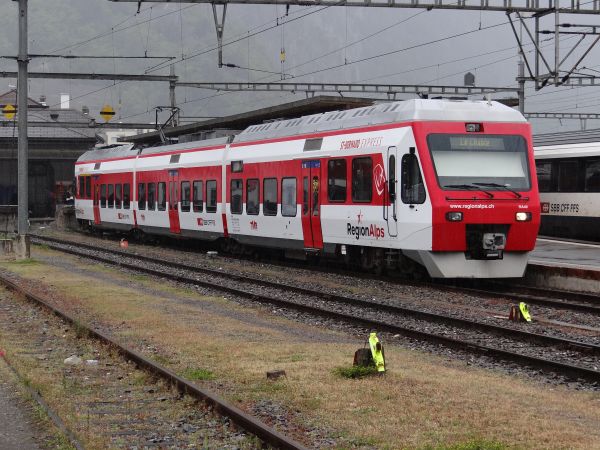
Region Alps is a joint venture train company. First the train company MO, Martigny - Orsières fused with the MC Martigny-Châtelard railway
into what became the Transports de Martigny et Régions TMR. Then TMR and the local services of the federal state railways SBB created a joint venture
which is today known as Region Alps. Region Alps functions as a subsidiary of SBB. TMR has today a joint operation with the French SNCF. All these are shown on this page.
This train is one of the so called Nina trains. Nina stands for Niederflur Nachverkehr, that is low-floor local traffic. Nina trains were
designed and built for the BLS Lötschbergbahn 1999-2003. At that time what was then the company MO, felt that they too needed new trains
and ordered three new Nina trains. A fourth one was later bought used from BLS. They were built by Bombardier and Alstom in southern
Switzerland, not far away from Martigny, the main station of MO. Officially Nina should be listed as the type RABe 527.
This Nina train has been repainted in the colours of Region Alps. As can be seen, the livery is almost totally equal to the usual SBB
colourings and large SBB's stickers have also been added at the sides of the train.
Picture from Martigny 3.5.2016 by Ilkka Siissalo.
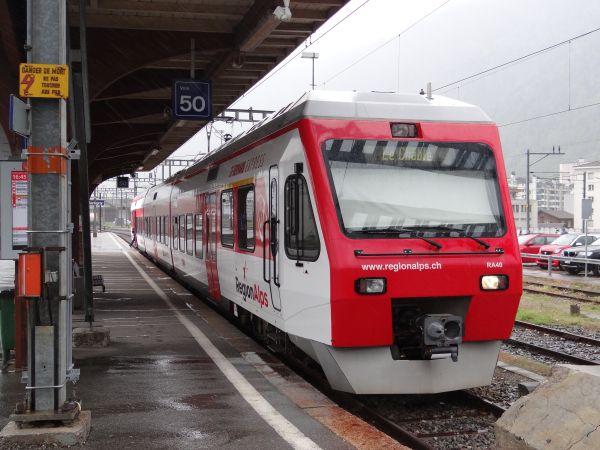
The same Nina train as shown above, ready to leave from Martigny towards Le Châble. This is the original MO route, now brandnamed
as part of the St. Bernard Express, since it climbs a long way up the St. Bernard pass mountain route.
Picture from Martigny 3.5.2016 by Ilkka Siissalo.
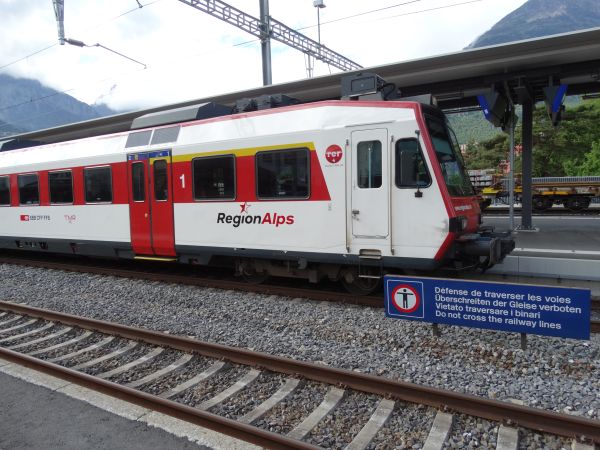
When the new SBB subsidiary Region Alps was founded as a fusion product of TMR's and SBB's local train services, SBB brought into the new company
several modernised NPZ (Neue Pendelzug) trains which SBB calls now after their modernisation Domino trains. These same trains still work on the same
lines as they did during their SBB times and not much has changed, except for some new paint and the new Region Alps stickers on the sides of the trains.
Picture of a Region Alps Domino train from Martigny 10.5.2023 by Ilkka Siissalo.
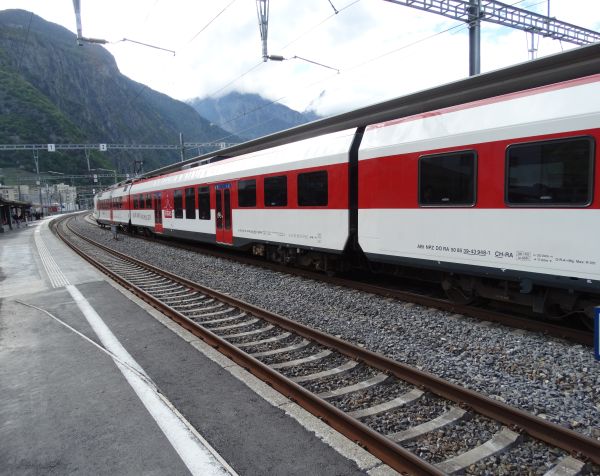
This is the same Domino train as was in the picture above. In their modernisation, these trains received two new low-floor middle coaches.
Picture of a Region Alps Domino train from Martigny 10.5.2023 by Ilkka Siissalo.
As explained above, the private but cooperating companies MO, Martigny-Orsières and MC, Martigny-Châtelard, were fused into what became TMR,
Transports de Martigny et Régions. Here we have pictures from the MC and MO routes from the times when TMR already existed.
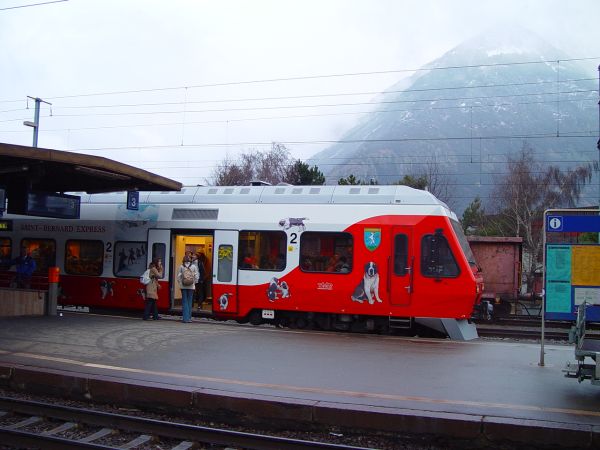
One of the same Nina trains as above, but photographed at a time when it was still carrying the colours of MO, but had already the stickers of
TMR on its sides.
Picture from Martigny 23.1.2003 by Ilkka Siissalo.
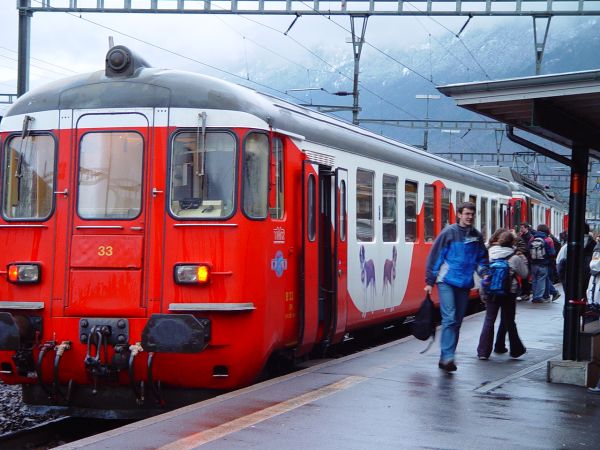
In 2003 not yet all the train services on the old MO line could yet be run with modern Nina trains. This is a steering cab coach Bt 33
from the year 1965 and behind it is the motorwagon ABDe 4/4 also from the year 1965. Note that in front of the door there are logos
of both MO (the blue one) and of TMR on top of each other.
Picture from Martigny 23.1.2003 by Ilkka Siissalo.
The former Chemin de fer Martigny–Orsières - Martigny-Orsières railroad MO
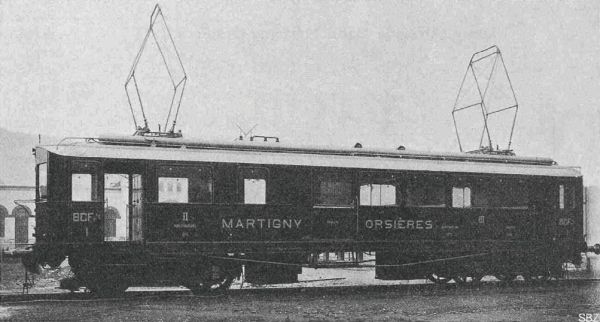
This BCFe 4/4 no.1 was the very first train of the train company MO. This picture has been taken on 22.4.1911. It's unknown who took the
picture. According to the Swiss law it is now a public domain picture as it has been published more than 70 years ago. It was published
at the Schweizerische Bauzeitung, Band 57, Heft 16. Source: Wikipedia.
At that time the MO railroad used 8000 V 15 Hz AC. The whole railroad was converted to the standard electric system of SBB in 1949.
MO had altogether four of these trains, all built in 1910. They were all rebuilt for 15kV AC in 1949.
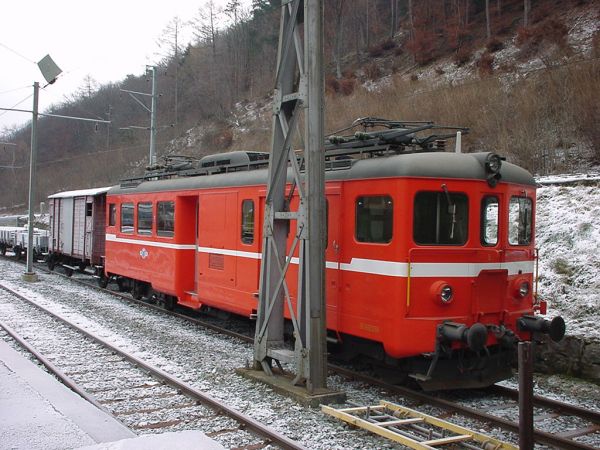
This ABDe 4/4 no.5 was the second generation of MO's trains. It was built in 1955 to supplement the very old four first trains. This one
remained in working order and served as a reserve until 2002, when it was sold to the railway museum Bahnmuseum Kallnach.
Picture from Orsières 29.12.2001 by Ilkka Siissalo.
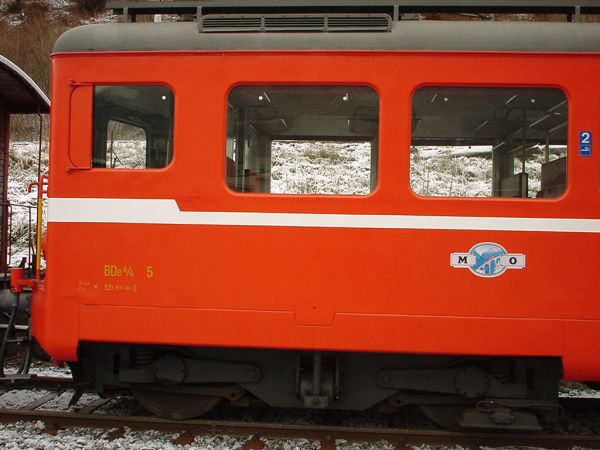
A detailed view of the ABDe 4/4 no.5. Note the old logo of MO. At the side of the train it is listed as BDe 4/4 and not ABDe. This is because
at that time they felt the old first class was no longer worth to be designated as first class and should be part of second class.
Picture from Orsières 29.12.2001 by Ilkka Siissalo.
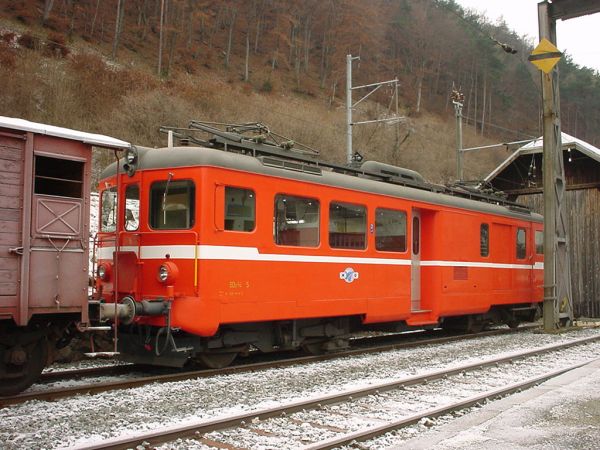
Still one more view of the ABDe 4/4 no.5. This shows clearly the transportation needs of the MO railway in the 1950s. Only half of the motorwagon
is for passengers, the other half was for cargo. And it was typical of the time that this motorwagon had one or more wooden cargo coaches attached
as there was an alumnium factory in Orsières which created a need to transport a lot of goods. Road transportation in those mountaineous slopes
was not too easy by that time.
Picture from Orsières 29.12.2001 by Ilkka Siissalo.
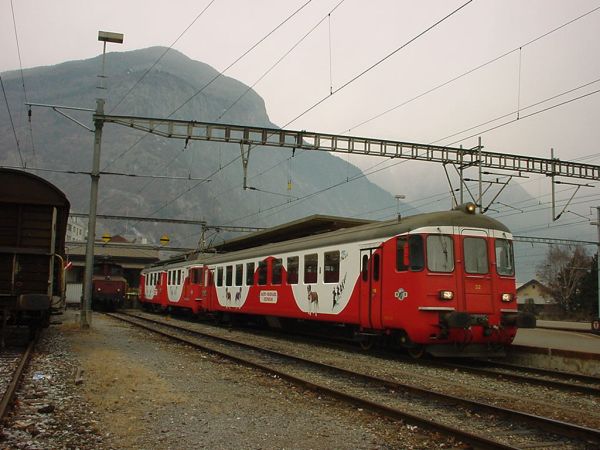
This was then the third generation of MO's trains. This is one of the so called EAV trains. The EAV train was a standardised train type with
one motor wagon ABDe 4/4 plus one steering cab coach Bt. This was a common type and much used by many private railways in Switzerland, for
example Südostbahn, Mittelthurgaubahn etc. These trains were built in 1965. Here we see one of them ready to leave towards Orsières from
Martigny in 2001. Note the new painting.
Picture from Martigny 29.12.2001 by Ilkka Siissalo.
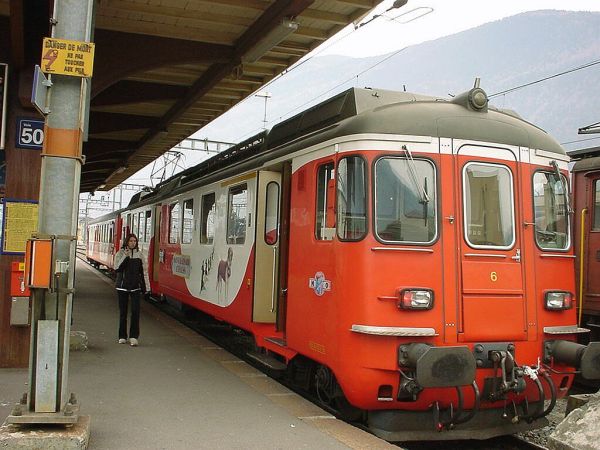
A close look at the EAV type motorwagon ABDe 4/4 no.6 from 1965. MO / TMR had five of these EAV trains. One of them was bought used from
RVT, Region Val de Travers. Two EAV trains probably still now remain in working order at Region Alps. Nowadays these EAV trains are known
by their new type designation ABDe 537, numbers 506–.
Picture from Martigny 29.12.2001 by Ilkka Siissalo.
The former MC, Martigny-Châtelard railroad
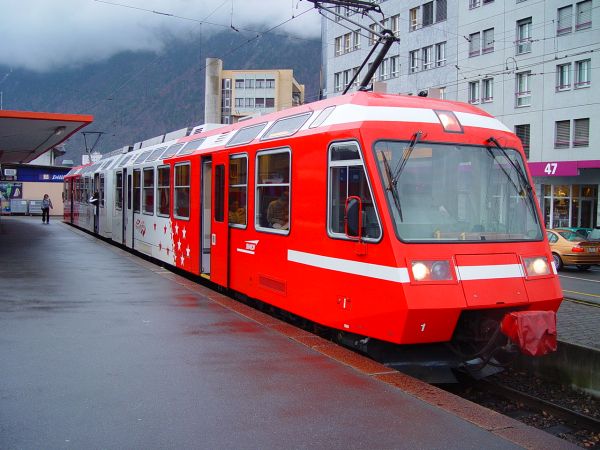
The MC, Martigny-Châtelard railroad is already well over 100 years old. It begins in the city of Martigny as a metre gauge line, which first runs as an
adhesion railway, but then at its steepest points uses a system Strub cog wheel third rail drive system. The railway is electrified with 850 V DC. Using the
rack rail system it climbs up at up to 20% incline. The line is
only 19 km long, but yet it takes close to an hour for a train to climb up. Originally the railroad was founded as Chemin de fer de Martigny–Châtelard,
but today it extends beyond Châtelard over the Swiss-French border and connects with the French Saint-Gervais–Vallorcine railway. The Saint-Gervais–Vallorcine
line is also metre gauge, but it doesn't use an overhead catenary, but a third side rail for collecting electric current. These trains are equipped
with both overhead DC electricity systems as well as side rail electricity systems, so that the same train can ride through, starting from the former
MC track down at Martigny and then running through Châtelard on to Chamonix and beyond. This through running service is now marketed under the brand name of
Mont-Blanc-Express. The same name is used also for marketing the former MO line and bus routes over the Alps to Italy.
This is the Mont-Blanc-Express. It is of the type Z800 built by the Swiss company Stadler. It was bought together with the French SNCF which needed similar trains for their
Saint-Gervais–Vallorcine railway. This was the first type that could run both on the MC route and the SNCF route.
Picture from Martigny 23.1.2003 by Ilkka Siissalo.
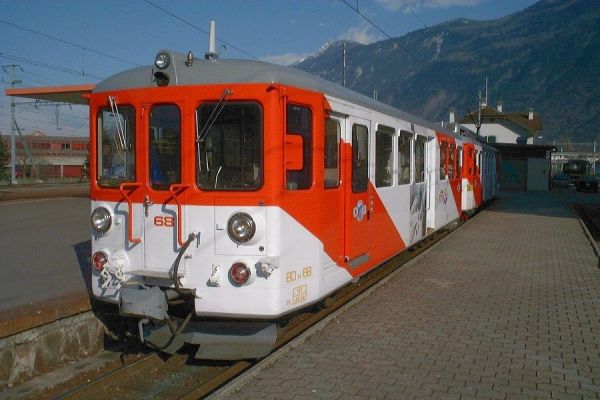
This is how the trains of MC, Martigny-Châtelard, used to look like before the merger to form TMR. This is the steering cab coach
BDt 68. It was typically kept together with one of the motor wagons of the type BDeh 4/4, which were from the years 1957 and 1964. Later, after a refit,
these motorwagons were called ABFeh 4/4 (= first and second class plus freight).
This picture was published by "Klaus K" under the
Creative Commons CC-BY-SA 3.0 license
as free to use. It has been reported to be taken 17.3.2000 from Martigny.
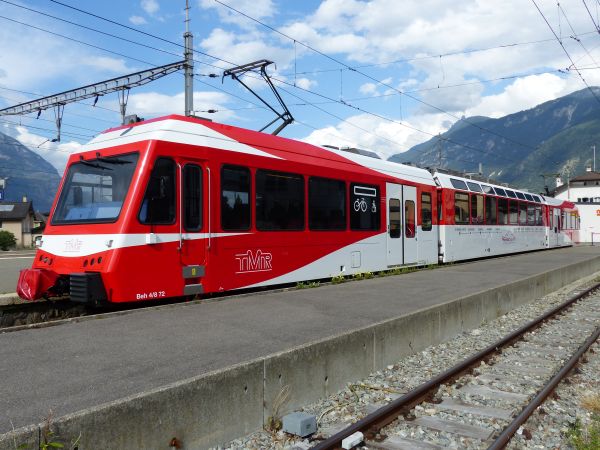
These are the current trains running on the former MC line. This is today TMR's Beh 4/8 n.72, built as Stadler's type Stadler Spatz. TMR has two of them for
the service from Martigny up. They were built in 2011. These are almost identical with the newest SNCF trains running now on the Saint-Gervais–Vallorcine railway.
This picture is a picture published by "Whgler" under the
Creative Commons CC-BY-SA 4.0 license
as free to use. It has been reported to have been taken 10.7.2017 in Martigny.

